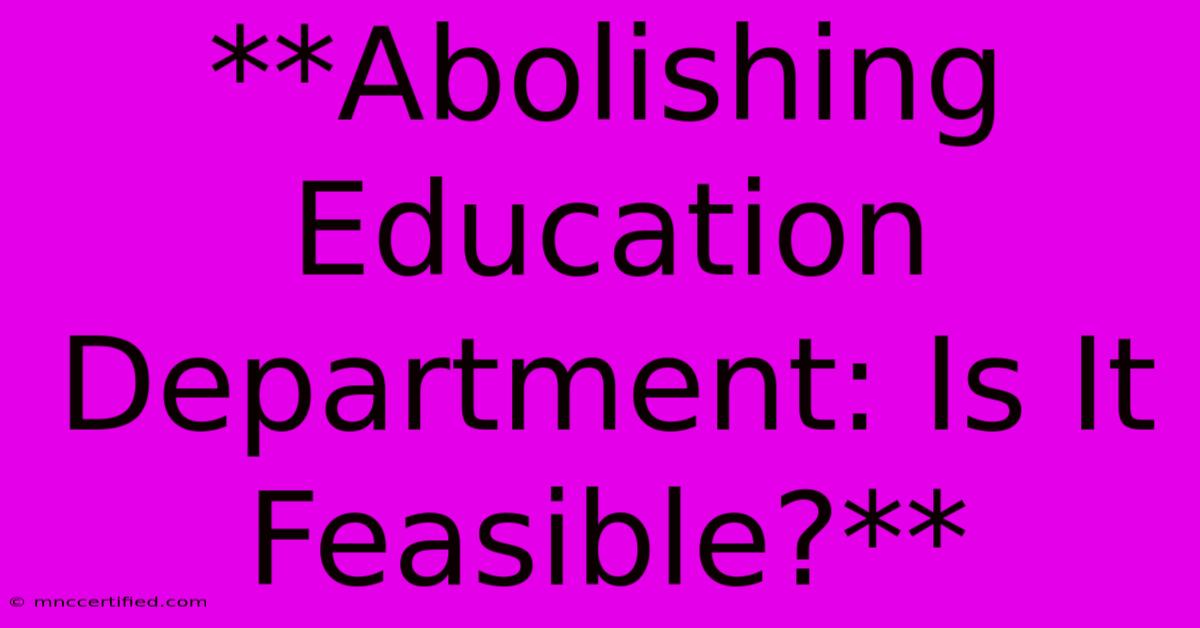**Abolishing Education Department: Is It Feasible?**

Table of Contents
Abolishing the Education Department: Is It Feasible?
The idea of abolishing the U.S. Department of Education has been a recurring topic in political discourse, especially among conservatives. Supporters argue that it would reduce federal overreach, promote local control of education, and potentially save taxpayer dollars. However, critics counter that such a move would be detrimental to the nation's education system, leaving vulnerable students and communities without crucial support.
This article explores the potential consequences of abolishing the Department of Education, examining both sides of the argument and considering the feasibility of such a drastic action.
Arguments for Abolition:
1. Reduced Federal Overreach and Increased Local Control: Proponents of abolishing the Department of Education argue that it would shift power back to states and local communities, allowing them to tailor education systems to their specific needs and values. They believe that a federal bureaucracy is inherently inefficient and unresponsive to individual communities, creating a one-size-fits-all approach that stifles innovation and local autonomy.
2. Fiscal Savings and Reduced Bureaucracy: Another common argument is that abolishing the Department of Education would save taxpayer money by eliminating a significant federal agency and its associated costs. Supporters point to the substantial budget allocated to the Department and argue that those funds could be better utilized at the state and local levels.
3. Empowering Parents and Communities: Advocates for abolishing the department believe that it would empower parents and communities to have a greater say in their children's education. By removing federal regulations and mandates, local communities could establish their own curricula, educational standards, and funding mechanisms, fostering a more responsive and accountable system.
Arguments Against Abolition:
1. Loss of Funding and Support for Vulnerable Students: Critics of abolishing the Department of Education highlight the potential loss of federal funding and support for disadvantaged students, including those with disabilities, English language learners, and those from low-income families. They argue that the Department plays a crucial role in ensuring equitable access to quality education for all students.
2. Lack of Accountability and Standards: Some opponents worry that abolishing the Department of Education would lead to a lack of accountability and national standards, resulting in uneven educational quality across the country. Without federal oversight, they argue, there would be no mechanism to ensure that all students receive a high-quality education, regardless of their location.
3. Impact on Civil Rights and Equity: A significant concern is the potential impact on civil rights and equity. Critics argue that the Department of Education plays a crucial role in enforcing anti-discrimination laws and ensuring equal opportunities in education. Without its oversight, they fear a resurgence of discriminatory practices and a widening gap in educational outcomes based on race, gender, and socioeconomic status.
Feasibility and Practical Considerations:
While the debate surrounding the abolition of the Department of Education is highly charged, it's important to consider its practical feasibility.
1. Political Challenges: Abolishing a major federal agency would face significant political hurdles. Congress would need to pass legislation to dissolve the Department, which would require a majority vote in both the House and Senate. This process is likely to face intense opposition from Democrats and even some Republicans, making it a challenging endeavor.
2. Funding Implications: The elimination of the Department of Education would require the redistribution of its funding. This would involve complex negotiations and decisions about where those funds would be allocated, potentially creating conflicts between state and local interests.
3. Implementation Challenges: The implementation of any new educational system after abolishing the Department would be complex and time-consuming. It would involve developing new policies, regulations, and funding mechanisms, requiring careful planning and coordination.
Conclusion:
The idea of abolishing the Department of Education remains a controversial topic with compelling arguments on both sides. While the potential benefits of increased local control and reduced federal overreach are appealing to some, the potential consequences for vulnerable students, national standards, and civil rights raise significant concerns.
Ultimately, the feasibility of such a drastic action hinges on the ability to address these challenges and create a new system that effectively supports all students while fostering local autonomy and accountability. The debate is likely to continue, with the future of the Department of Education remaining a crucial focal point in American education policy.

Thank you for visiting our website wich cover about **Abolishing Education Department: Is It Feasible?**. We hope the information provided has been useful to you. Feel free to contact us if you have any questions or need further assistance. See you next time and dont miss to bookmark.
Featured Posts
-
Illinois National Insurance Company
Nov 13, 2024
-
What Does Ee Stand For In Insurance
Nov 13, 2024
-
Crisp Packets Urgent Message For State Pensioners
Nov 13, 2024
-
Progressive Insurance Eugene Oregon
Nov 13, 2024
-
Does Insurance Cover Hotel Expenses
Nov 13, 2024